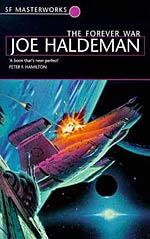
![]() Deven Science
Deven Science
10/4/2010
![]()
The title is not talking about the war I’m currently fighting here in Afghanistan, but if you thought it was, this is precisely why many people think that The Forever War, by Joe Haldeman, is just as relevant today as when it was written, in the mid-1970s.
The Forever War is about a group of citizens drafted into an intergalactic war with aliens that no one has actually seen before. The author wrote the book twenty years in the future, so that the war starts in the 1990s. Due to relativistic time dilation, going off to fight only two battles before being able to return home sees them return to a world no longer recognized, as something like seven hundred years has passed on Earth. Money no longer exists. The currency is the Calorie, a direct effect of decades of starvation and overpopulation as Earth became a war economy over the last several centuries. Not comfortable on a planet they no longer recognize as home, it’s off-planet once again for these war veterans, preferring combat in hostile worlds to facing changes at home.
The Forever War is considered a science fiction classic, and indeed, it is well written, and the science of it stands out as top-notch. The way the author fully integrates relativistic effects into the plot, rather than trying to work a cheat around it, as most science fiction does, is worthy of a tip of the hat, and very well painted, visually.
However, overall I’m not sure the book lives up to the hype. Its cultural concepts are extremely dated, to the point of being embarrassing in many places. Homosexuality is promoted in Haldeman’s future, as population control, so that these veterans, obviously straight, are seen as the queer ones. This kind of reversal could be interesting, and it helps to further isolate are heroes from society, except that the author handles it a bit clumsily, so that I personally got the impression that despite his trying to sound liberal and tolerant, he himself feared the rise of homosexuality as a norm.
The book is of its time. Haldeman came home from an unpopular war, wherein soldiers like him didn’t even go because they wanted to, but because the government told them that they had to. How, he thought, can we come home to such hate and disrespect, when we didn’t even volunteer to fight this war? In that, he had a valid point, I suppose, though it might be irrelevant, since soldiers who volunteer to fight in an unpopular war still shouldn’t then accept being spit on, or called names like “babykiller.” The fact that he had no choice due to the draft was probably just salt on the wound, by his estimation. It was a country, a world, that he no longer recognized. He was obviously very pessimistic about where the country was headed, and his brief tour (most draft tours were 13 months) seemed like it might as well have been centuries. I could see how it would seem like the war made more sense than the home he returned to.
Still, while I would give the novel an overall positive rating, it doesn’t make it by much. The dated concepts and views in the book were often enough to pull me out of the story, or cringe. Indeed, much older science fiction works by Asimov or Heinlein often age better in their concepts than this book does. The saving grace for the novel after all of this is the suddenly upbeat turn at the end, as the author seems to reflect on how one’s world can still be what one makes of it.
http://deven-science.livejournal.com/